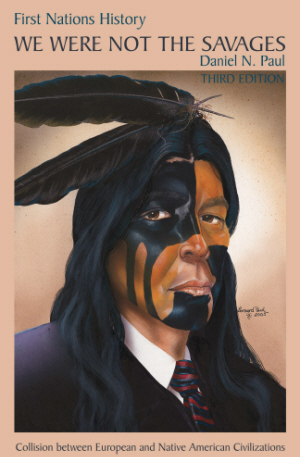 |
|
HOME |
|
CONTACT |
|
WEBSITE MAP |
|
MAP
Land Of The Mi'kmaq |
|
FIRST NATIONS HISTORY"We Were Not
The Savages" |
|
Click to Access Over 230 Pages of FIRST NATIONS History Highlights Paintings, Photos |
|
Newspaper Columns Written By
Daniel N. Paul
1994 - 2005 |
|
Links
First Nation Education, Business, History, etc., Websites |
|
Links
Non-First Nation Websites |
|
Journalist
And
Reviewer |
|
Consultant
Indian Act And Related Issues
|
|
Justice Of The Peace |
|
Daniel N. Paul Resume |
|
History Bits And Native American News Events |
|
Mi'kmaq First Nation Photos
************************ |
|
Marc Lescarbot, a French lawyer, articulated this warped Christian law in his explanation of France's right to Acadia in 1618:
"The earth pertaining, then, by divine right to the children of God [Christians], there is here no question of applying the law and policy of Nations, by which it would not be permissible to claim the territory of another. This being so, we must possess it and preserve its natural inhabitants, and plant therein with determination the name of Jesus Christ, and of France." (pg. 74 - We Were Not the Savages) |
|
|
 |
 |
 |
Chapter 1 | Chapter 2 | Chapter 3 | Chapter 4 | Chapter 5 | Chapter 6 | Chapter 7
Chapter 8 | Chapter 9 | Chapter 10 | Chapter 11 | Chapter 12 | Chapter 13 |Chapter 14
|

|
|
Chapter 1
We Were Not the Savages - Civilization, Democracy and Government
The Need for a Native American Historical Perspective
The reason for the urgent need for First Nations histories penned by First
Nations authors was articulated to me by Chuck LeCain, a retired highschool
history teacher of thirty-one years: “‘Until the lion has his historian, the
hunter will always be the hero’ (unknown author). For more than a decade you
have been the lion’s historian. Take pride in knowing that you have assisted
countless others, not only to review, but to re-think history. I gained greatly from
your writings. Wela’lin!” (Personal memo, March 18, 2005).
To begin this chronicle, I would like to explain the need for a Native
American historical perspective and also my use of certain historical references.
The subjugation of the Northeastern North American Native American nations
by the English Crown was accomplished with the use of much barbarity.
Not surprisingly, these actions have been studiously ignored or downplayed by
most Caucasian male historians. However, their reluctance to enter into honest
discussion and critically comment on the matter does not obscure the facts that
the documents and journals left behind by colonial English and French scribes
irrefutably prove: the blood of the citizens of the Mi’kmaq, Maliseet and their
smaller sister nations, located in what is today eastern Canada and the New
England states of the United States of America, was spilled by the English to
the point where many were left on the verge of extinction or had passed into
it.
The same historical documents also prove beyond a reasonable doubt that
supposedly “civilized” colonial English politicians and military personnel used
means of terror against First Nations peoples which would repel truly civilized
people. Thus, the reluctance of most Caucasian male scribes to discuss and put
to paper the details of such behaviour is understandable. To do so is to question
the very civility of those who perpetrated the atrocities. As a person who has
no such reluctance to expose the crimes against humanity committed by the
English, I wrote this book. It details a chronicle of a people’s inhumanity that
has few, if any, equals in human history.
When amassing the information that was needed to write about the English
invasion of the territory of the Mi’kmaq, reams of information about the
Tribe’s Amerindian allies also had to be digested. For data on the early stages
of the invasion, I relied heavily upon doctorial dissertations by Caucasian male
scholars and on documents, books and articles prepared by Caucasian male
|

|
|
PURCHASE INFORMATION
can be found on the right hand side of the HOME Page
**************************
|
|





